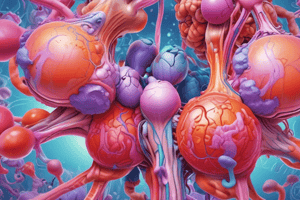Podcast
Questions and Answers
What is the Endocrine System?
What is the Endocrine System?
What processes do hormones control?
What processes do hormones control?
Hormones are produced by?
Hormones are produced by?
Specialized cells
Cells secrete hormones into?
Cells secrete hormones into?
Signup and view all the answers
Blood transfers hormones to?
Blood transfers hormones to?
Signup and view all the answers
Amino acid-based hormones include?
Amino acid-based hormones include?
Signup and view all the answers
Steroids are made from?
Steroids are made from?
Signup and view all the answers
Prostaglandins are made from?
Prostaglandins are made from?
Signup and view all the answers
Hormones affect only certain tissues or organs called?
Hormones affect only certain tissues or organs called?
Signup and view all the answers
What are the effects caused by hormones?
What are the effects caused by hormones?
Signup and view all the answers
Describe steroid hormone action.
Describe steroid hormone action.
Signup and view all the answers
What is the control of hormone release primarily maintained by?
What is the control of hormone release primarily maintained by?
Signup and view all the answers
What is the role of the anterior pituitary?
What is the role of the anterior pituitary?
Signup and view all the answers
What is the function of Growth Hormone (GH)?
What is the function of Growth Hormone (GH)?
Signup and view all the answers
What hormones do the adrenal glands produce?
What hormones do the adrenal glands produce?
Signup and view all the answers
What role does insulin play in the body?
What role does insulin play in the body?
Signup and view all the answers
What does glucagon do?
What does glucagon do?
Signup and view all the answers
Where is the pineal gland located?
Where is the pineal gland located?
Signup and view all the answers
What does the thymus produce?
What does the thymus produce?
Signup and view all the answers
What are the primary hormones produced by the ovaries?
What are the primary hormones produced by the ovaries?
Signup and view all the answers
What is the effect of aging on the endocrine system?
What is the effect of aging on the endocrine system?
Signup and view all the answers
Study Notes
The Endocrine System
- The endocrine system is known as the second messenger system of the body, utilizing hormones that travel via the bloodstream.
- Hormones regulate key processes such as reproduction, growth and development, immune response, homeostasis, and metabolism.
Hormone Production and Action
- Hormones are synthesized by specialized cells and secreted into extracellular fluids before being transported by blood to target sites, influencing the activity of other cells.
- Hormones can be categorized as amino acid-based (proteins, peptides, amines) or steroids (derived from cholesterol).
Prostaglandins and Mechanisms of Action
- Prostaglandins are made from highly active lipids, with diverse physiological roles.
- Hormones interact with specific target cells that possess unique protein receptors, triggering changes like electrical state alterations, protein synthesis, and enzyme activation.
Steroid vs. Nonsteroid Hormone Action
- Steroid hormones diffuse through the plasma membrane, enter the nucleus, and activate gene expression to produce new proteins.
- Nonsteroid hormones bind to membrane receptors, initiate intracellular reactions through second messengers, and promote specific cellular responses.
Hormonal Regulation
- Hormone levels are regulated via negative feedback mechanisms, ensuring that hormone release responds to changes in blood levels, halting when appropriate levels are achieved.
- Hormonal stimuli activate endocrine glands, while humoral (blood ion levels) and neural (nerve impulses) stimuli also play crucial roles.
The Pituitary Gland
- The pituitary gland, about the size of a grape, is divided into two functional lobes: anterior (glandular tissue) and posterior (nervous tissue).
- Anterior pituitary hormones include growth hormone, prolactin, ACTH, TSH, and gonadotropic hormones (FSH and LH), each targeting specific organs or functions.
Posterior Pituitary Hormones
- Hormones released include oxytocin, which stimulates uterine contractions and milk ejection, and ADH (antidiuretic hormone), which regulates water retention and can increase blood pressure.
Thyroid and Parathyroid Glands
- The thyroid gland produces thyroid hormones (T3 and T4) and calcitonin, crucial for metabolic regulation and calcium homeostasis.
- Parathyroid glands secrete parathyroid hormone, regulating blood calcium levels by stimulating osteoclasts and enhancing absorption in kidneys and intestines.
Adrenal Glands
- Located atop the kidneys, adrenal glands consist of an outer cortex and inner medulla.
- The cortex produces mineralocorticoids (e.g., aldosterone), glucocorticoids (e.g., cortisol), and sex hormones, while the medulla produces catecholamines (e.g., epinephrine, norepinephrine) for stress response.
Pancreas and Islet Hormones
- The pancreas contains islets that produce insulin and glucagon, both crucial for regulating blood sugar levels.
- Insulin facilitates glucose uptake into cells, whereas glucagon increases blood glucose levels by promoting glucose release from the liver.
Other Hormone-Producing Organs
- Hormones are also secreted by the pineal gland (melatonin), thymus (thymosin), ovaries (estrogens, progesterone), and testes (testosterone).
- The placenta produces various hormones, including HCG, to support pregnancy.
Aging and Endocrine Function
- While most endocrine functions operate normal until old age, menopause results from decreased ovarian efficiency and lower estrogen.
- Age-related declines in growth hormone and other hormones can affect overall endocrine output and function.
Studying That Suits You
Use AI to generate personalized quizzes and flashcards to suit your learning preferences.
Description
Test your knowledge on the Endocrine System with this quiz based on Anatomy Chapter 9. Explore key concepts such as hormone functions, their roles in major body processes, and how they contribute to homeostasis. Perfect for students looking to reinforce their understanding of this crucial system.




